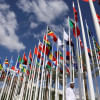Will 2024 Be the New 1933?

On January 30, 1933, Adolf Hitler was appointed the chancellor of Germany. To his supporters, it was a day of "national revolution" and rebirth. Germany, they believed, needed the restorative force of an authoritarian strongman after 14 years of the liberal-democratic Weimar "system." That night, Hitler's torch-bearing brownshirts marched through central Berlin to mark the dawn of a new era.
It was also a triumphant moment in the history of popular deception. Since the Weimar Republic's early days, its politics had been defined by disinformation campaigns, including the lie that Weimar democracy was the work of a cabal of Jews and socialists who had "stabbed Germany in the back" to ensure its defeat in World War I.
Today, few people dispute that Hitler's arrival was a turning point in world history, the start of a political process that would lead to World War II and the Holocaust. But Hitler did not "seize power," as the Nazis later claimed. Instead, as his biographer Ian Kershaw has explained, he was "levered into power" by a small group of influential men.
Faced with today's global crises, there is no room for optimism. We are potentially in another hinge year. If liberals act now, they can still prevail.
One of those men was Franz von Papen, who served as chancellor in 1932. He (infamously) thought that Hitler and the Nazi Party—by far the largest party after the Reichstag elections of 1932—could be used to advance a conservative agenda. Similarly, Germany's president, former Field Marshal Paul von Hindenburg, wanted to use Hitler to restore the monarchy.
But these conservatives' plans were soon swept away by Hitler's ruthless leadership, Nazi violence, and the German public's rush to join the regime and become a part of the promised national reawakening. The liberals and social democrats who opposed Hitler were either subjected to violence or caught up in their own optimistic escapism. As bad as things got, they assured themselves, Hitler's rule would eventually collapse. Nazi infighting would surely bring an end to the new government.
Beyond liberals and socialists, a wider section of German society assumed that Hindenburg, who had promised to be president of all Germans, would keep Hitler on a leash, while others expected the army to do so. All had been fooled by Hitler's ability to look respectable in the final years of the Weimar Republic.
Within 100 days of Hitler becoming chancellor, as historian Peter Fritzsche has shown, the Nazis' ruthless drive for power became all too clear. By the end of the summer of 1933, German society had been brought into line. There were no more independent political parties, trade unions, or cultural organisations. Only Christian churches retained some degree of independence.
A year later, in the summer of 1934, Hitler ordered the murder of his internal party rivals and, following Hindenburg's death on August 2, declared himself German Fuhrer. His dictatorship was complete. By then, the first concentration camps were already up and running, and the economy was being put on the path to war.
This period of history remains all too relevant today. Hundreds of millions of people will vote in pivotal elections this year, and even though the warning signs are there, few commentators are prepared to say it out loud: 2024 might be the new 1933.
Just imagine the world a year from now, with disinformation having taken down democratic majorities around the world. President Donald Trump ends the United States' support for Ukraine. Nato is no longer a restraint on Vladimir Putin's dreams of building a new Russian Empire across Eastern Europe. A critical mass of far-right parties in the European Parliament blocks a unified European response. Poland, Estonia, Lithuania, and Latvia are on their own. With the war in Gaza having expanded into a regional conflict, Putin seizes the opportunity to launch another blitz, accompanied by long-range missiles. And amid the chaos, China decides to seize Taiwan.
The prospects for 2024 are so bleak that many refuse to contemplate them. Just as liberals in 1933 predicted that Hitler would quickly fail, wishful thinking today is clouding our judgement. We are sleepwalking—to borrow Christopher Clark's apt metaphor for the onset of World War I—into a new international order.
In her masterful two-volume history of the interwar era, Zara Steiner refers to 1929-33 as the "hinge years," when idealism in international relations was replaced by the "Triumph of the Dark." But as late as 1926, liberals had seemed to be winning: French Foreign Minister Aristide Briand and his German counterpart, Gustav Stresemann, shared the Nobel Peace Prize for their work on Franco-German reconciliation, and Germany joined the League of Nations. Extreme nationalism seemed to be isolated in Mussolini's Italy.
Faced with today's global crises, there is no room for optimism. We are potentially in another hinge year. If liberals act now, they can still prevail.
In a promising sign, hundreds of thousands of Germans recently took to the streets to support democracy and diversity, and to denounce the far right. But demonstrations in one country are not enough. German liberals must be joined by others across the continent. A continent-wide demonstration would send a powerful message. The sense of urgency must extend upwards, particularly to business leaders like JPMorgan Chase CEO Jamie Dimon, who, hedging his bets, has already started cozying up to Trump.
Not so long ago, European leaders came together and did whatever it took to save the euro, because they recognised that the single currency's failure would end the European Union itself. Europeans now must demand the same urgency to meet this year's threats. The EU needs a plan for a world without Nato. It needs new tools to deal with member-state leaders like Hungarian Prime Minister Viktor Orban and Slovakian Prime Minister Robert Fico, both of whom would rather kiss Putin's ring than defend democracy. It is simply unacceptable that Orban still wields a veto over EU decision-making.
In the US, political mobilisation is the big variable. Trump's opponents must set aside their differences and unite behind President Joe Biden. We know all too well where disunity and naive optimism can lead.
Mark Jones, assistant professor of history at University College Dublin, is the author of '1923: The Forgotten Crisis in the Year of Hitler's Coup.'
Copyright: Project Syndicate, 2024
www.project-syndicate.org
Views in this article are the author's own.
Follow The Daily Star Opinion on Facebook for the latest opinions, commentaries and analyses by experts and professionals. To contribute your article or letter to The Daily Star Opinion, see our guidelines for submission.

 For all latest news, follow The Daily Star's Google News channel.
For all latest news, follow The Daily Star's Google News channel. 











Comments